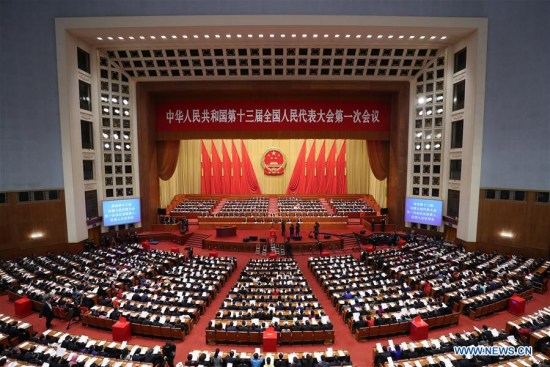
The third plenary meeting of the first session of the 13th National People's Congress (NPC) is held at the Great Hall of the People in Beijing, capital of China, March 11, 2018. (Xinhua/Wang Ye)
China's national legislature underlined Party's leadership when summarizing its work over the past five years on Sunday.[Special coverage]
The leadership of the Communist Party of China (CPC) is the essential element and greatest strength of the people's congress system, said Zhang Dejiang, chairman of the 12th National People's Congress (NPC) Standing Committee, when delivering a work report of the committee at the first session of the 13th NPC.
Chinese leaders Xi Jinping, Li Keqiang, Li Zhanshu, Wang Yang, Wang Huning, Zhao Leji and Han Zheng attended the plenary meeting.
"We must uphold the centralized, unified leadership of the Party Central Committee with Comrade Xi Jinping at the core," Zhang said.
The national legislature should closely base the planning and advancement of its work on the overall work of the Party and the country, and promptly follow up on the needs of the Party and the people, he said.
Zhang stressed that the national legislature should fully implement Xi Jinping Thought on Socialism with Chinese Characteristics for a New Era.
During the period, the national legislature enacted 25 laws, revised 127 ones, passed 46 decisions on legal questions and other major issues, and issued nine legal interpretations.
In terms of their oversight duty, lawmakers have inspected enforcement of 26 laws and one legislative decision, heard and deliberated 83 work reports, and conducted 15 special inquiries and 22 research projects.
Efforts were made to raise public awareness of the Constitution. With the NPC Standing Committee's decision, all officials have to publicly swear allegiance to the Constitution when taking office.
Since 2013, the NPC Standing Committee has launched a two-year research program and developed guidelines to improve people's congresses at county and township levels, followed by revision to several laws.
In 2015, the 12th NPC passed a revision to the Legislation Law, granting more Chinese cities the power to issue local regulations.
Zhang voiced his confidence in the people's congress system.
"The confidence the Chinese people have in the people's congress system derives from their confidence in the strong leadership of the Party and in the path, theory, system and culture of socialism with Chinese characteristics," he said.
Zhang also underlined the role of the people's congresses in realizing the principle of "the people running the country" and advancing law-based governance.
Although this system has proved to be an effective political system, Zhang said that it does not mean that the national legislature can be complacent.
He suggested that new mechanisms for legislative, oversight and deputy-related work should be explored, and efforts should be made to enrich and broaden the practices of people's congresses.
According to the report, in next five years China's national legislature will speed up compiling the civil code, formulate a foreign investment law and e-commerce law, and do research on formulating a real estate tax law.
Environment laws will be one of the priorities. The soil pollution prevention law will be drafted while the law on solid waste control will be revised.
It also plans to revise the criminal procedure law and draft a community correction law.
Before the plenary meeting, executive chairpersons of the presidium of the first session of the 13th NPC held their third meeting Sunday morning, followed by the fourth meeting of the presidium, both of which were presided over by Li Zhanshu.


















































